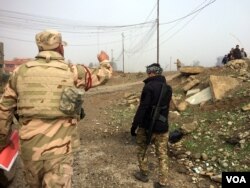"My neighbors were just outside, sitting in the sun that afternoon," says Abdulhameed Hossamadin, a few meters from his Mosul kebab stand. "Then the mortar hit. My house shook and all the glass shattered."
"They were a family of 14. Now only two women and a child are alive," he adds.
Hossamadin's neighbors were killed by mortar fire a month ago, when Islamic State militants still controlled his area. Now the fighting has subsided and IS militants have been forced back to the other side of the Tigris River, but mortars continue to rain down in eastern Mosul.
In less than an hour traveling within the range of fire, we hear 12 mortars crash to the ground. Locals recount the casualties in recent days, saying they are afraid that if IS can send mortars across the river, they can potentially send even heavier weapons.
"Yesterday a mortar fell on a shop selling children's clothing," says one man who didn't want to be named for fear of IS returning. "A small child was killed, and five more were children injured."
The shop owner is also in the hospital, he says, and three more people were injured the day before. These are just the casualties he knows about.
Still fleeing
On the other side of town, out of range of mortar fire, Omar, a former wedding photographer, relaxes with his sister and her four children. Five days earlier, under the cover of darkness, he fled IS militants in western Mosul by walking over a broken bridge pieced together with sheets of metal.
Despite his stealth, IS snipers shot at him as he ran.
Inside IS territories, life is becoming increasingly difficult, with stricter rules and harsher punishments, he says.
"They are making it harder to obey their rules," Omar explains. "They are whipping people and killing them more and more."
Families also continue to flee areas controlled by Iraqi forces, because of mortar fire and the extreme poverty that has overwhelmed Mosul residents.
Roughly 350 people arrived at displaced persons camps on Friday alone, and nearly 160,000 people have been forced to leave their homes since the Mosul offensive began in October. The United Nations says the fight for western Mosul could displace another three-quarters of a million people.
In a neighborhood that was the scene of heavy fighting two weeks ago, a small crowd gathers at a makeshift marketplace, selling vegetables, eggs and snacks. Food prices have plummeted since IS was forced out, but families say low prices are of little use when there is no money.
Unemployment under IS was widespread, with many professions banned by the militant group. Families spent all of their savings and went on to sell their belongings to survive, says Hamad, a father of eight and a former oil worker.
"There are no services here," he says. "There is no city water or electricity and no salaries. People have spent their money and now there is nothing left."









